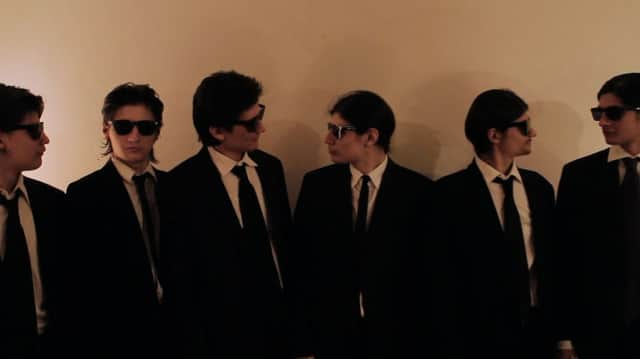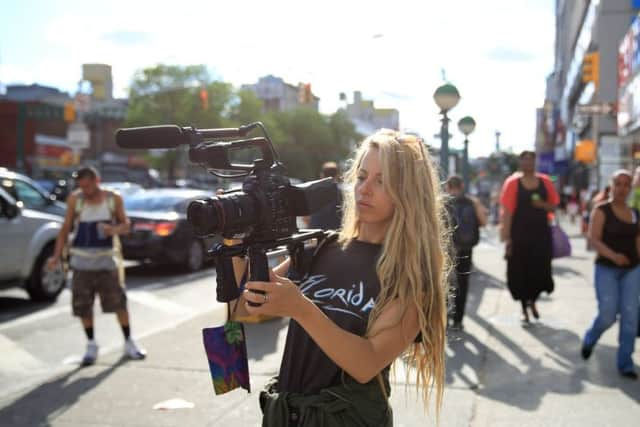The Wolfpack: Crystal Moselle on an extraordinary tale


Some documentary makers stumble across great stories, others go chasing after them. Crystal Moselle did both. Literally. “I was just walking down First Avenue in New York City and they ran past me on the street,” says the 34-year-old filmmaker, referring to the subjects of her Sundance-winning debut The Wolfpack.
The “they” in question are a group of six brothers of American-Peruvian descent, who, when she first saw them in 2010, were aged between 11 and 18. “There was just something about them that was very intriguing,” she continues of the Angulo clan, which comprises siblings Bhagavan (now 23), twins Govinda and Narayana (22), Mukunda (20), Krisna (17) and Jagadesh (16).
Advertisement
Hide Ad“Their long hair, the way they were dressed... they all had sunglasses on and were in some sort of outfit that was all planned out,” she recalls. “I just ran after them and asked where they were from.”


What they told her wasn’t all that revelatory at first: raised Hare Krishna (hence their Sanskrit names), they lived in an apartment on a nearby housing estate in Manhattan’s Lower East Side and were more interested in what she did, telling her they wanted to break into the industry. “That’s how the friendship started,” says Moselle, “but then I’d get a clue here and there about their upbringing.”
What she began to discover was increasingly strange. Revelations about home schooling that didn’t sound all that unusual gradually gave way to more coded disclosures. “They told me I was their first friend, which was definitely strange. I thought maybe they were just reclusive. Then Makunda told me about escaping the house and after that I knew this was a lot more complicated than I realised…”
The boys – along with their younger sister Visnu and their ex-hippy mother Susanne – had been living a bizarrely sheltered and heavily controlled life. Until around 2009 (the year before Moselle met the family), they’d barely been out of the House Department-owned flat they shared (and mostly continue to share) with their Peruvian father, Oscar Angulo.
Fearful of a world that didn’t conform to the incoherent pseudo hippy religious idyll he’d hoped to create for his tribe-like family, Oscar had kept them under lock and key, only letting his children (and their mother) out a few times a year – and some years not at all.
Their main experience of the world came instead came from the movies that Oscar allowed them to watch on VHS and DVD. Over the years they built up a collection of 5,000 or so films, and favourites such as The Dark Knight and Reservoir Dogs fuelled their imagination to such an extent they began diligently transcribing the dialogue and using their makeshift scripts to recreate their own versions with homemade props and costumes.
Advertisement
Hide AdHence their excitement at meeting an actual filmmaker in Moselle … and hence the sunglasses they were wearing when they first met her – props, as we discover from the opening scenes of The Wolfpack, from one of their many cloistered recreations of Reservoir Dogs.
If such a warped upbringing sets alarm bells ringing about the type of kids this might produce, the Angulos are not the feral miscreants the title implies (the name came from a friend of Moselle who said the boys looked like a “sweet pack of wolves” when she first met them).
Advertisement
Hide AdOn the contrary, the boys are very articulate and the film subtly underscores some of the positive power that movies – even violent movies – can have as a means of escaping and coping with what is clearly an abusive situation.
“Film became this medium for them to exorcise these emotions and [exert] a power that they didn’t have at all in their life,” says Moselle, on the phone from her home in New York. “Creative expression is, I think, a form of therapy. They could exorcise these feelings of powerlessness by being like a gangster or being like Batman, who’s looking out over the city and protecting the world. They would create these characters and eventually that led to Manuka feeling powerful enough to leave the house and start to change things.”
Just 15 at the time, Manuka had been so enraptured by The Dark Knight that he eventually had to see what the outside world was like for himself. And so, one day, while his father was out buying food, he snuck out, disguised as Michael Myers (the indestructible bogeyman from the Halloween movies). As recounted in the film, the incident led not only to his arrest, but a period of evaluation in a psychiatric hospital. But it also changed the power dynamic in the household. The brothers collectively started standing up to their father and going on more excursions on their own. Moselle ran into them at the start of this process and spent the next four-and-a-half years hanging out with them as they ventured into the world, capturing on film such formative experiences as their first trip to the beach and their first trip to the cinema.
What becomes hard to reconcile in the resulting movie is the power the boys ascribe to their father and the cowed, rather pathetic man who makes fleeting appearances in the film. “When I first met him, I had no idea he was like that,” confesses Moselle of Oscar, whom she does confront on camera about his treatment of his children (she gets only gibberish, half-formed answers in response). “By that time [the power dynamic] had shifted so much, but as time went by and I learned the backstory, I did learn what power he had.”
Here, the film can, at times, feel frustrating oblique in its unwillingness to take a more probing, investigative approach, particularly when the boys and their mother (who says she can’t be “too candid” about what she has gone through) explicitly and implicitly discuss various forms of mental and physical abuse that have taken place over the years. Aside from a brief discussion about the boys seeing a therapist in the wake of Manuka’s hospitalisation, for instance, the authorities are strangely absent from their life. (The film may also leave viewers wondering about the welfare of the boys’ sister, Visnu, who is referred to by one of her brothers early on as existing in her “own special world” and remains very much in the background. “She has Turner Syndrome ,” clarifies Moselle “She’s unable to express herself.”)
Moselle doesn’t see any of this as an issue, though. “I think the film gives a clear view of their life,” she says. “There are questions that are left unanswered, but I think that’s OK. I think there’s enough there for people to understand what happened.”
Advertisement
Hide AdShe may be right. Her obvious closeness to and affection for the boys comes through in the film. As a result, it never feels exploitative or judgmental. If anything, in keeping with the boys’ obsession with Batman, The Wolfpack almost functions like a superhero origins story – showing how something potentially traumatic has, through collective strength of character, been transformed into something good. “I think it’s absolutely the beginning of the story,” says Moselle. Is it one she’d be interested in revisiting further down the line? “I’m not sure,” she laughs. “But you never know.”
• The Wolfpack is in cinemas from Friday. Director Crystal Moselle and members of the Angulo family will participate in a Q&A session following a preview screening at Glasgow Film Theatre tomorrow night